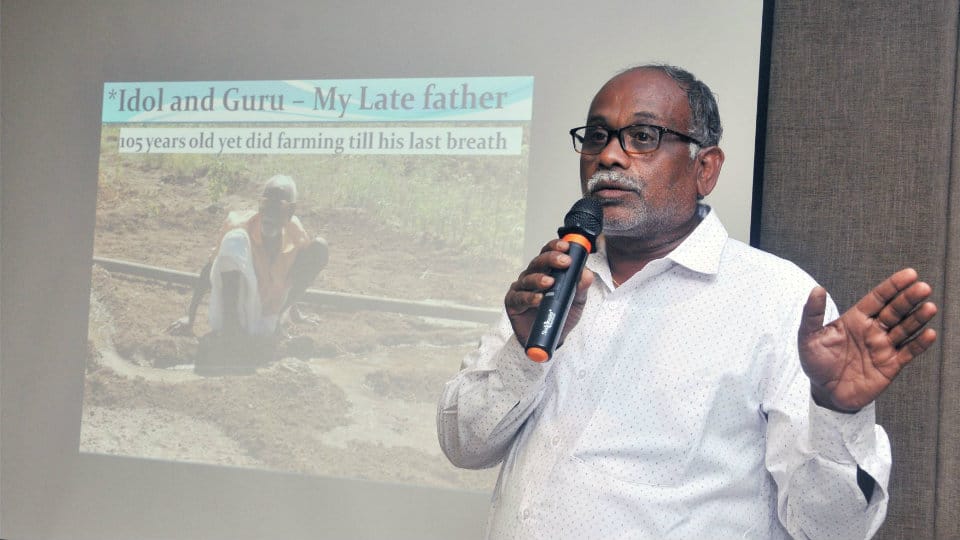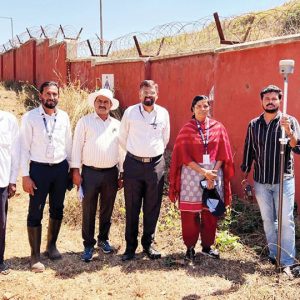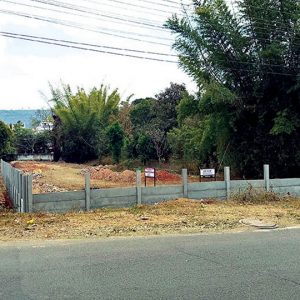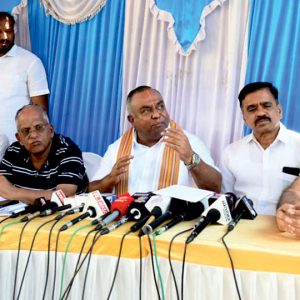Mysuru: For those who worry about India’s water crisis, Ayyappa M. Masagi’s solution is simple: Conserve so that it is available aplenty for the next generation. Popularly referred to as “Water Magician,” “Water Warrior,” “Water Gandhi” and “Water Doctor,” Ayyappa Masagi combines rustic intelligence with modern technology and ideas to conserve and utilise water more effectively and efficiently.
Ayyappa Masagi was in the city yesterday to give a presentation on water conservation organised as part of “Swacha Kaveri” initiative launched by Mysuru Chapter of National Real Estate Development Council (NAREDCO) at a private hotel.
In a passionate plea to conserve rainwater, Masagi said that actually there was no shortage of water. “But the attitude of the community, politicians and bureaucracy towards water conservation is disturbing,” he said.
Masagi, who has been featured in the Limca Book of Records for constructing thousands of lakes and recharging over 2,000 borewells, is also credited for initiating water conservation projects in more than 4,200 locations. “The traditional concept of “Ingu Gundi” where household water (not sewage) is collected in small pits next to the houses can work wonders in recharging groundwater that is fast depleting,” he said.
He founded Water Literacy Foundation and Rain Water Concepts, non-profit organisations, to spread water conservation awareness among masses with the vision of making India a water-efficient nation. “The latest plan of State Government to denotify lakes is just a money-making exercise. We must all oppose it,” he said.
With simple language and presentation style marked with humour and anecdotes, Masagi, who quit his job as a mechanical engineer to take up water conservation, said that when India got Independence, it had 47 percent of thick forests which has now been reduced to just 7 percent.
Ayyappa Masagi was born into a family of poor farmers in Gadag district in Karnataka. “In my childhood we faced plenty of water problems. I used to wake up with my mother at 3 am to go and fetch water. This made me to take an oath to try and conserve water every day,” he said.
A recipient of Jamnalal Bajaj Award for Application of Science and Technology for Rural Development, Masagi said recharging borewells and practising non-irrigational agriculture methods were the answers to water problems farmers faced. “Concepts like tree-based farming, earthen dams, and afforestation can recharge groundwater. Rain is caused by yellow energy (sun), blue energy (sea) and green energy (trees),” he explained.
Ayyappa Masagi considers earth to be the biggest filter. His idea is to capture rainwater, filter it and then store it underground. “My pit-based rainwater harvesting system is a structure made of boulders, gravel, sand, and mud. When it rains, water trickles through gravel and sand and it slowly charges the subsoil. This also prevents water from evaporating,” he said.
Ridiculing the Karnataka government’s plan of cloud seeding, Masagi warned, “Please don’t go against nature. It will hit back with vengeance and there will be no place for us.”
Swacha Kaveri
In his presentation on “Swacha Kaveri,” Deepak Lulla said that NAREDCO will take up the responsibility of cleaning River Cauvery. “The ill effects of polluting the river, destroying its water inlets are already showing. The government can’t do everything and it is our responsibility to save the river,” he said.
Initially, NAREDCO will prepare a vision document and present it to the district administration where ways and means will be suggested to clean the river. “Once we obtain the permission and clearances, the cleaning campaign will be launched,” Deepak Lulla said.
Appealing NAREDCO members to join hands by deputing manpower for the cleaning campaign, he said that initiatives will also be launched to educate people along the Cauvery basin on water conservation and ensuring a pollution-free river.
Seconding Deepak Lulla was D. Srihari of GSS Foundation who opined that the student community and the district administration must be involved in the campaign.
“The initiative must also involve planting trees along River Cauvery. With student force and a proactive administration, we can clean the river in one year,” he said, pledging support for the initiative.
NAREDCO Mysuru convener N. Divyesh introduced the guests. Member Dhirendra Mehta gave a presentation on Real Estate Regulation and Development Act while Nagesh gave a presentation on home loans.
NAREDCO Karnataka President Manoj Lodha was present.








Recent Comments